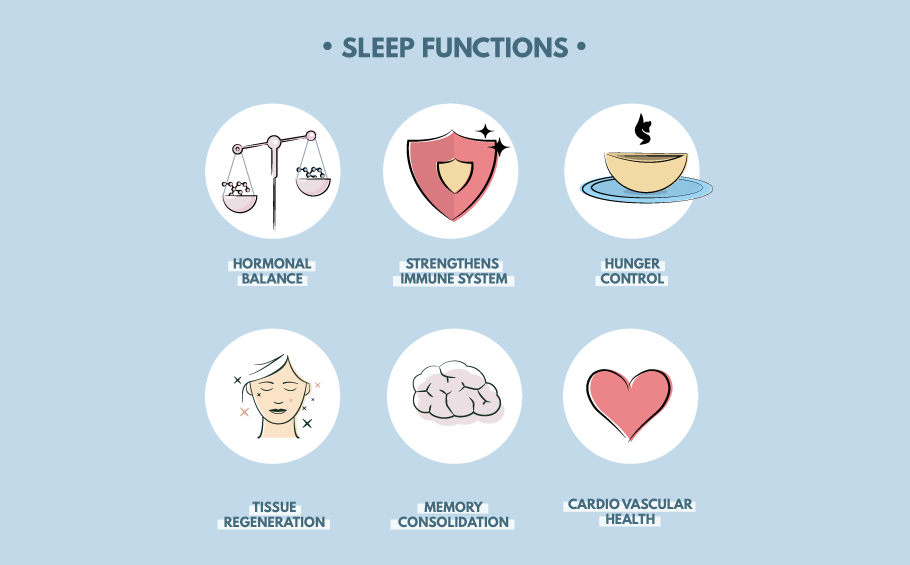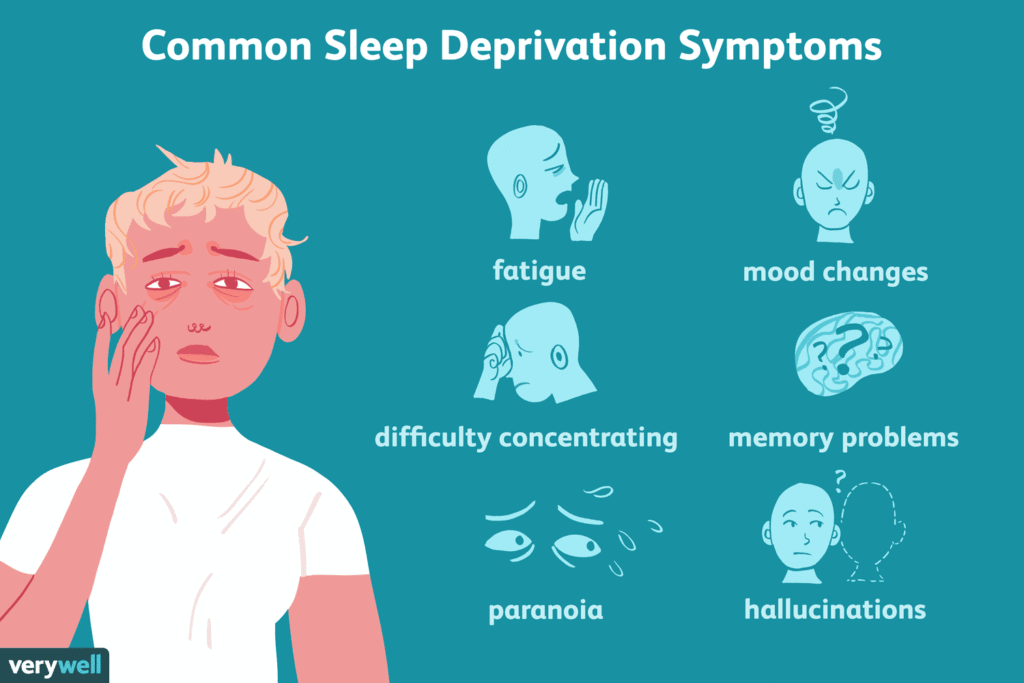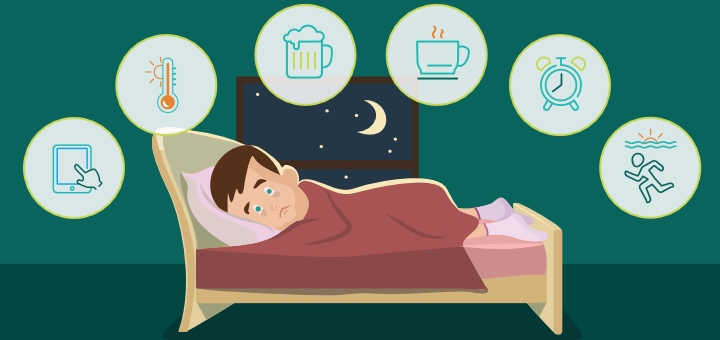
Sleep is a vital biological process essential for physical restoration, mental function, and emotional balance. Quality sleep regulates hormones, repairs tissues, supports immunity, enhances memory, and reduces risks of chronic diseases such as obesity, diabetes, and heart problems.
Key Takeaways
- Sleep supports brain functions like learning, memory, emotional control, and decision-making.
- Deep and REM sleep stages are critical for physical healing, mental processing, and mood stability.
- Lack of sleep increases risks of obesity, diabetes, hypertension, anxiety, and depression.
- Poor sleep weakens immunity, lowers focus, and raises accident risk.
- Caffeine, alcohol, stress, screen exposure, and irregular routines disrupt sleep quality.
- Maintaining a consistent schedule, limiting screens, and creating a calm environment improve sleep health.
What is Sleep?
Sleep is an altered state of consciousness characterized by reduced interaction with surroundings and a quiet, still body. Despite this physical inactivity, the brain remains highly active, performing critical functions essential for health. Sleep supports every process in the body, influencing physical and mental performance, immune defense, and overall well-being. The importance of sleep is great as it helps in memory consolidation, emotional regulation, and energy restoration.
Additionally, quality sleep reduces the risk of chronic illnesses, supports metabolism, and strengthens the body’s ability to fight diseases, making it indispensable for overall health and longevity.
The Functions of Sleep
Sleep serves several vital functions essential for overall health and well-being:

- Learning and memory consolidation: Sleep plays a key role in solidifying information and experiences from the day. It enhances focus and concentration, enabling the brain to process and organize new memories effectively. Without adequate sleep, the ability to learn and retain new information significantly declines.
- Emotional regulation: Quality sleep is critical for managing emotions and stress effectively. Sleep helps the brain process emotional experiences, allowing for a calmer, more balanced response to challenges. Insufficient sleep can lead to heightened irritability, anxiety, and difficulty managing stress.
- Judgment and decision-making: Sleep impacts our ability to assess situations, recognize potential dangers, and make sound decisions. Sleep-deprived individuals are more likely to make impulsive or risky choices due to impaired cognitive function. A well-rested mind is better equipped to evaluate and respond to situations thoughtfully.
- Problem-solving: Sleep enhances creative thinking and problem-solving skills by improving cognitive flexibility. The brain continues to process information during sleep, often leading to insights or solutions upon waking. This is why “sleeping on” a problem is an effective strategy for finding answers.
- Energy conservation: Sleep reduces overall energy expenditure by lowering metabolic rates and physical activity. This allows the body to conserve energy resources for essential functions, such as healing and maintaining internal processes. Energy conservation during sleep ensures optimal functioning during wakeful periods.
- Growth and healing: During sleep, the body releases growth hormones that promote tissue growth and repair. This process is crucial for muscle recovery, wound healing, and maintaining healthy skin and bones. Sleep is particularly important for children and adolescents, as it supports physical development.
- Immunity: Sleep strengthens the immune system by promoting the production of infection-fighting antibodies and cells. Adequate rest helps the body respond effectively to illnesses and reduces susceptibility to infections. Chronic sleep deprivation, on the other hand, weakens the immune system, increasing the risk of diseases.
Sleep Stages and Architecture
A typical sleep cycle consists of four stages, each with distinct characteristics and functions that contribute to overall rest and recovery. These stages repeat multiple times throughout the night, forming the architecture of sleep.
- Stage N1 (Light Sleep): This is the lightest stage of sleep, lasting only a few minutes as the body transitions from wakefulness to rest. During this stage, muscle activity decreases, and the body begins to relax, although it’s easy to be awakened. Brain activity slows slightly, setting the foundation for deeper stages of sleep.
- Stage N2 (Intermediate Sleep): This stage accounts for about half of a typical night’s sleep and is marked by periods of brain activity called sleep spindles and K-complexes. These bursts of activity are thought to play a role in memory retention, learning, and protecting the brain from external disturbances. The body further relaxes, and its core temperature begins to drop in preparation for deeper sleep stages.
- Stage N3 (Deep Sleep): Also known as slow-wave sleep, this is the deepest and most restorative stage of non-REM sleep. During this stage, blood pressure drops, and the heart rate and breathing slow significantly, allowing the body to repair and regenerate tissues. This stage is critical for waking up feeling refreshed and for supporting immune system health and physical recovery.
- REM Sleep (Rapid Eye Movement): REM sleep is characterized by rapid eye movements, vivid dreaming, and temporary muscle paralysis that prevents the body from acting out dreams. This stage is essential for emotional regulation and memory consolidation, as the brain processes and stores information from the day. REM sleep is also thought to play a role in cognitive functions, such as problem-solving and creativity.
The Power of Sleep for Health: Detailed Explanation
Sleep is a fundamental pillar of good health, essential for the proper functioning of the body and mind. Without adequate, quality sleep, critical processes that maintain physical health, cognitive function, and emotional well-being begin to falter, increasing the risk of chronic disease, mental health challenges, and impaired daily performance.
Physical Health
Sleep is foundational to maintaining physical health because it supports many vital body systems and processes. Here are the key ways sleep benefits your physical health:
- Blood Pressure Regulation: During sleep, your blood pressure naturally dips, giving your heart a chance to rest. When sleep is inadequate or disrupted, this “nighttime dipping” is less pronounced, resulting in persistently higher blood pressure. Elevated blood pressure over time increases the risk of heart disease, heart attacks, and stroke.
- Heart Disease Risk Reduction: Multiple studies have shown that people who sleep less than 6 hours regularly have a significantly higher chance of developing heart-related problems. Sleep apnea and insomnia particularly strain the cardiovascular system due to repeated awakenings and oxygen supply interruption.
Metabolic Function
Proper sleep is vital for maintaining a healthy metabolism, as it helps regulate blood sugar levels, hormone balance, and appetite control. Disruptions in sleep can impair these processes, increasing the risk of insulin resistance, weight gain, and metabolic disorders like type 2 diabetes and obesity.
- Improved Insulin Sensitivity: Good quality sleep enhances your body’s ability to process insulin effectively, helping maintain stable blood sugar levels. Poor sleep leads to insulin resistance, a precursor to type 2 diabetes.
- Glucose Metabolism: When sleep is insufficient, your body’s glucose metabolism is impaired, causing elevated blood sugar and higher risk of diabetes.
- Weight Management: Sleep deprivation leads to hormonal imbalances increasing ghrelin (which stimulates appetite) and reducing leptin (which signals fullness). This imbalance promotes overeating and weight gain. Research consistently links poor or shortened sleep to increased Body Mass Index (BMI) and higher prevalence of obesity.
Immune System Support
Sleep strengthens the immune system by promoting the production of infection-fighting substances, such as cytokines. When you do not sleep enough, the body produces fewer of these protective agents, which lowers your ability to fight off colds, flu, and other infections. Consistent poor sleep can increase vulnerability to illnesses and slow recovery time.
Mental Health
Sleep’s effect on mental health is equally profound, influencing cognition, mood, and stress responses:
- Alertness and Focus: Quality sleep refreshes the brain’s alertness and concentration capabilities. Without it, the ability to stay attentive diminishes rapidly, affecting work productivity and everyday tasks.
- Memory Consolidation: During sleep especially REM and deep NREM sleep the brain actively processes and stabilizes information learned throughout the day. This helps you retain facts, skills, and experiences, making learning efficient and effective.
- Decision-Making and Problem-Solving: Well-rested individuals demonstrate better executive functioning, including planning, reasoning, and problem solving. Sleep deprivation impairs judgment and slows reaction times.
Emotional Well-being
Emotional well-being is deeply connected to the quality of our sleep, as restful nights help regulate mood, reduce stress, and build resilience against anxiety and depression.
- Sleep plays a vital role in regulating mood and emotions. The brain regions that govern emotion and memory remain active during sleep, particularly REM sleep.
- Chronic sleep problems are strongly linked to anxiety and depression. Sleeping well can reduce symptoms and improve emotional resilience.
- Sleep provides the “mental reset” needed for coping with everyday stress, improving your ability to manage challenges calmly and constructively.
Performance and Safety
Sleep’s influence on daily performance and safety spans multiple critical areas:
- Good sleep encourages creativity, better problem-solving, and increased productivity.
- When well-rested, people make fewer errors and maintain sustained attention over longer periods.
- Conversely, sleep deprivation correlates with reduced work efficiency, mistakes, and absenteeism.
Consequences of Sleep Deprivation

Sleep deprivation, whether it’s not enough hours, low-quality rest, or frequent interruptions has powerful and immediate effects on nearly every part of mind and body. Even missing out on recommended sleep for just one or two nights can cause noticeable problems, and chronic deprivation greatly raises serious health risks over time.
Short-Term Effects
When you don’t get enough sleep, your body and brain quickly show signs of stress:
- Poor Concentration and Memory: The ability to focus, think clearly, remember details, and learn new things declines. Tasks that require attention or quick thinking become harder.
- Mood Swings: Even a single night of poor sleep can lead to increased irritability, anxiety, and difficulty managing emotions. Research finds strong links between sleep loss and mood disorders like depression.
- Drowsiness and Fatigue: Persistent tiredness slows reaction time, increases mistakes, and makes it hard to stay awake, especially during passive activities such as driving or long meetings.
- Weakened Immune Function: The body has trouble fighting off infections. Studies show sleep-deprived people are more likely to catch colds or the flu.
- Impaired Judgment: Sleep loss lowers insight and self-control, leading to riskier decisions and lowered awareness of one’s own limitations. This can result in accidents at work, on the road, or at home.
Long-Term Health Risks
Chronic sleep deprivation triggers ongoing stress responses throughout the body. Over time, it greatly increases the risk of various diseases and impairs quality of life:
| Condition | How Sleep Deprivation Contributes |
| Heart Disease | High blood pressure, higher risk of heart attacks and stroke |
| Obesity | Hormonal changes increase appetite and weight gain |
| Diabetes | Poor sleep reduces insulin sensitivity, raises diabetes risk |
| Mental Health Issues | Higher rates of depression, anxiety, and even psychosis |
| Cognitive Decline | Increased risk of dementia and Alzheimer’s disease in older adults |
| Weak Immunity | Frequent illness, slower recovery from infections |
| Accidents and Injuries | Drowsy driving, workplace and home accidents |
Factors Affecting Sleep

Sleep is shaped by a wide variety of factors that can either enhance or disrupt its quality. These influences include everything from your environment and daily habits to your physical and mental health. Understanding them helps you make choices that lead to better sleep, and also recognize when external forces are making a difference.
Diet and Nutrition
What we eat and drink plays a significant role in sleep quality and duration. Consuming caffeine late in the day can delay sleep onset by interfering with relaxation and melatonin production. Alcohol, while initially sedative, disrupts sleep cycles and reduces overall restfulness. On the other hand, foods like tart cherries, kiwi, and fatty fish promote better sleep due to their melatonin and serotonin-boosting properties.
Screen Time
Using screens before bed can significantly impact sleep by suppressing melatonin, the hormone that promotes sleep. Blue light from devices delays the body’s natural sleep-wake rhythm, making it harder to fall asleep. Additionally, engaging with stimulating or stressful content, such as social media or work emails, can increase mental alertness and anxiety, further hindering sleep quality.
Environmental Factors
Our surroundings greatly influence sleep quality. Exposure to natural light during the day helps regulate circadian rhythms, while excessive light at night can disrupt them. Noise, such as traffic or loud neighbors, can interrupt sleep cycles, and a cool, comfortable room temperature creates an ideal setting for restful sleep. These factors are crucial for maintaining uninterrupted and restorative sleep.
Lifestyle Factors
Lifestyle choices and habits directly affect sleep patterns. Shift work or irregular schedules can disrupt the body’s internal clock, leading to poor sleep. High stress levels often result in difficulty falling or staying asleep due to heightened mental activity. Regular exercise improves sleep quality, though intense workouts close to bedtime may overstimulate the body and delay relaxation.
Conclusion
Sleep is vital for physical and mental well-being. It helps repair muscles and tissues, supports immune function, and balances hormones, reducing the risk of chronic diseases. Quality sleep also sharpens memory, improves learning, and stabilizes emotions, helping to prevent anxiety and depression. Poor sleep weakens immunity, increases the risk of accidents, and impairs focus and decision-making.
Maintaining a consistent sleep routine and practicing good sleep hygiene can greatly improve overall health, mood, and daily productivity. Prioritizing sleep is one of the most effective ways to support a healthy, energetic, and balanced lifestyle at any age.
FAQs
Why is sleep important?
Sleep is essential for physical and mental health, including memory consolidation, emotional regulation, and bodily repair.
How much sleep do adults need?
Most adults need 7-9 hours of sleep per night to function optimally.
What happens if I don’t get enough sleep?
Sleep deprivation can lead to cognitive impairment, mood changes, and increased risks of chronic health conditions.
Can lack of sleep affect my weight?
Yes, sleep deprivation disrupts appetite-regulating hormones, potentially leading to weight gain.
Does sleep affect my immune system?
Adequate sleep is crucial for maintaining a strong immune system and fighting infections.
Can sleep deprivation cause mental health issues?
Chronic sleep deprivation increases the risk of developing anxiety and depression.
How does sleep affect learning and memory?
Sleep plays a vital role in cognitive function and consolidating memories from the day.
Is it bad to use electronic devices before bed?
Yes, screens emit blue light that interferes with melatonin production and disrupts sleep.
Can naps make up for lost sleep at night?
Naps can provide temporary relief but cannot fully compensate for insufficient nighttime sleep.
How does alcohol affect sleep?
Alcohol may help you fall asleep faster but reduces sleep quality and causes fragmented sleep.
References
- American Thoracic Society. (2015). Sleep is essential for vital functions such as neural development, learning, memory, emotional regulation, cardiovascular and metabolic function, and cellular toxin removal. Retrieved from https://www.atsjournals.org/doi/10.1164/rccm.201504-0767ST
- Diekelmann, S., & Born, J. (2010). Sleep facilitates the consolidation of memories learned before sleep and the acquisition of new memories to be learned after sleep. Retrieved from https://www.frontiersin.org/journals/systems-neuroscience/articles/10.3389/fnsys.2014.00046/full
- Medic, G., Wille, M., & Hemels, M. E. H. (2017). Inadequate sleep is associated with various health issues, including hypertension, obesity, type-2 diabetes, cardiovascular disease, impaired immune functioning, mood disorders, and neurodegeneration. Retrieved from https://pmc.ncbi.nlm.nih.gov/articles/PMC6281147/
- Grønli, J., Byrkjedal, I. K., & Vold, J. H. (2022). Seven hours of sleep per day was associated with the highest cognitive performance, which decreased for every hour below and above this sleep duration. Retrieved from https://www.nature.com/articles/s42003-022-03123-3
- University of Chicago. (n.d.). Sleep plays a crucial role in memory consolidation, brain functions, supporting the immune system, healing after injury or disease, and protecting against heart disease and diabetes. Retrieved from https://news.uchicago.edu/explainer/how-sleep-affects-human-health-explained
- Wild, C. J., Nichols, E. S., & Chee, M. W. L. (2018). The link between sleep and cognition has been well established in laboratory studies, with more sleep generally leading to better cognitive performance. Retrieved from https://academic.oup.com/sleep/article/42/3/zsz010/5288680?login=false
- Harvard Medical School. (n.d.). Most experts have concluded that getting enough high-quality sleep may be as important to health and well-being as nutrition and exercise. Retrieved from https://sleep.hms.harvard.edu/education-training/public-education/sleep-and-health-education-program/sleep-health-education-86
- Alhola, P., & Polo-Kantola, P. (2007). Sleep deprivation can result in the incapacity of the brain to process neural signals at optimal quantities, causing incoherent speech and other cognitive impairments. Retrieved from https://pmc.ncbi.nlm.nih.gov/articles/PMC10155483/
Dr. Amiah Rainey researches diet–disease relationships with expertise in vitamins, minerals, and biomarker methods. She earned a PhD from Harvard T.H. Chan School of Public Health (2019) and completed a postdoctoral fellowship at the NIH/NIDDK. With ~20 peer-reviewed publications (example) and experience on NIH-funded cohort studies, Amiah translates complex evidence into practical guidance. She advises on study design, evidence grading, and data transparency. Profiles: ORCID, Google Scholar; list affiliations and any disclosures.

